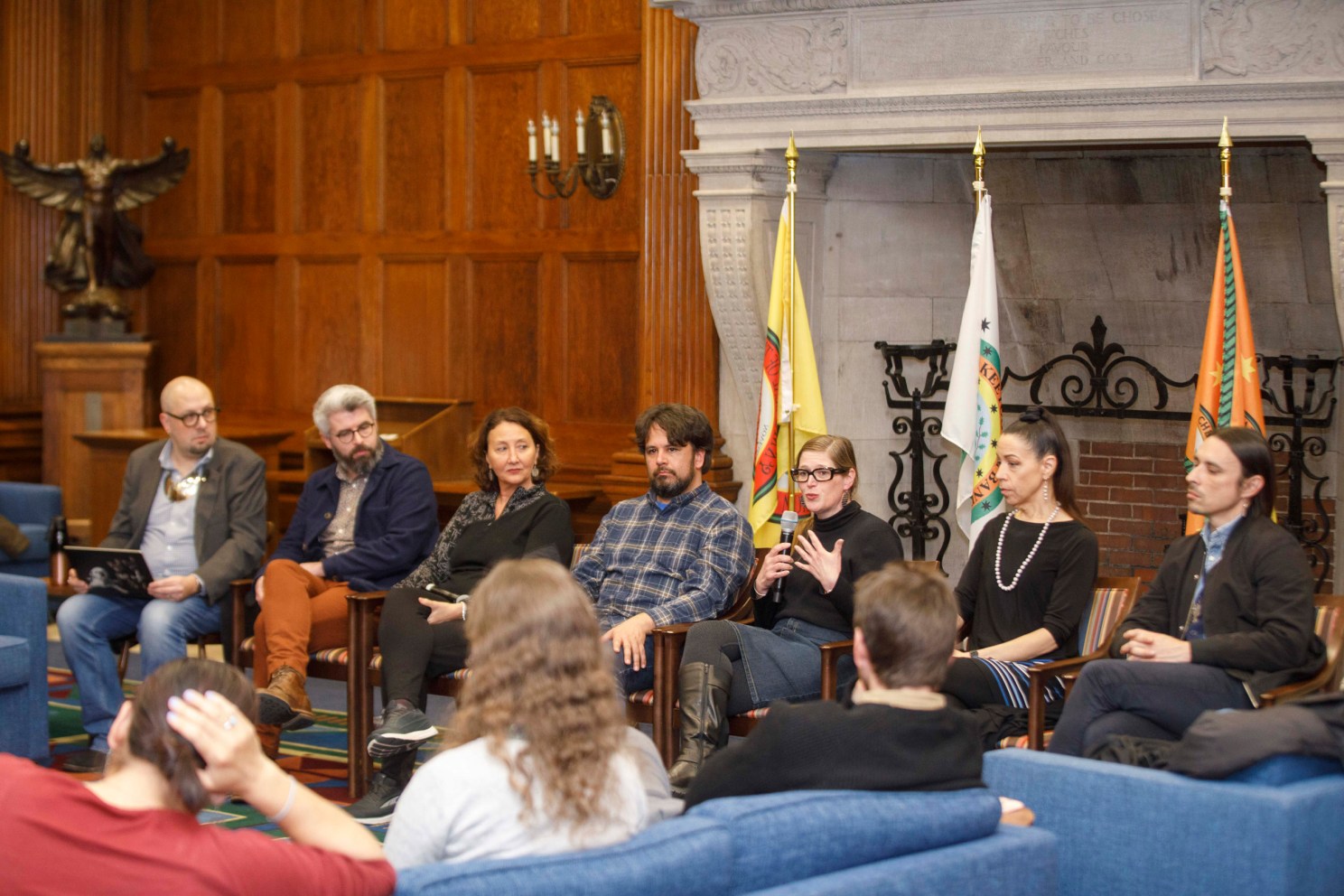Professors, mentors, Cherokee Scholars

Daniel Heath Justice (from left), Ross Mulcare, Stacy Leeds, Benjamin Frey, Julie Reed, Courtney Lewis, and Joseph Pierce take part in the three-day Cherokee Scholars symposium.
Kris Snibbe/Harvard Staff Photographer
Harvard colloquium unites Indigenous academics to deepen each other’s work
For Nathaniel Cummings-Lambert, the Cherokee Scholars symposium at Harvard was the first time he had the opportunity to interact with so many Cherokee academics. An enrolled citizen of the Eastern Band of Cherokee Indians, Cummings-Lambert brought his dissertation prospectus to the mentoring event.
“There’s many different resources here to draw on and a community that I don’t usually get to experience,” said the New York University fourth-year Ph.D. student, who is studying socio-cultural anthropology. “As someone who’s about to conduct a key piece of research, having this feedback has been really invaluable and has given me a whole bunch of new avenues to explore.”
The three-day colloquium held last month was the brainchild of Daniel Heath Justice, a visiting professor of ethnicity, indigeneity, and migration from the University of British Columbia. A citizen of Cherokee Nation and a member of the Cherokee Scholars (formed in 2009), Justice worked with the Harvard University Native American Program to bring emerging and established scholars together for mentorship and collaboration.
“One of the most powerful things about this experience — as someone who does not have an academic affiliation — has been feeling seen and heard in a space with other people.”
Nathaniel Cummings-Lambert
“Harvard has a long history with Indigenous scholars, both in terms of obligations to educate our young people and in addressing harms of the extractive and often very violent history of academic colonialism,” Justice said. “Supporting Indigenous scholars and scholarship isn’t just about what’s taught in the classroom or engaging in conversations about institutional accountability — it’s also about making space for Indigenous scholars to address our own needs on our own terms, in our own ways, in conversation with the institution and its resources, but not defined by them.”
During the first day, Cummings-Lambert and five other fellows met with a group of Cherokee mentors across disciplines to discuss aspects of their work including dissertations, upcoming books, and other research. Fellows also had the opportunity to meet with Harvard faculty to receive feedback.
Among the mentors in attendance was Stacy Leeds, a former justice on the Cherokee Nation Supreme Court, and the Willard H. Pedrick Dean, Regents Professor of Law at the Sandra Day O’Connor College of Law, Arizona State University.
“When we get together, it enriches all of our individual work because in some way you have blinders on around your particular field. But if you do interdisciplinary work and can hear from people from other perspectives, it will make your thinking that much deeper and your work product that much richer,” Leeds said.
Program fellow Jaquetta Shade-Johnson (Cherokee Nation), assistant professor at the University of Missouri-Columbia, said she received important feedback from more experienced scholars as well as advice to help navigate her teaching. Johnson is currently working on a monograph for the tenure process and brought a draft chapter to the symposium.
“My biggest takeaway is how amazing it is to have such a large group of us Cherokee Scholars from a variety of disciplines and a range of experiences all together to be able to share, connect, and have this really wonderful moment of fellowship, community, and connections,” she said.
Shade-Johnson said she was also grateful to find connections with Harvard faculty outside of the Cherokee Scholars group.
“Some of the larger pieces of advice that mentors shared are things that I’ve heard before but having them reiterated within this particular context helped it make sense to me,” she said, “especially around things like invisible labor and long-term implications of things that I do.”
Mentors and mentees also met for a panel discussion following a visit to the Peabody Museum of Archaeology and Ethnology.
“One of the most powerful things about this experience — as someone who does not have an academic affiliation — has been feeling seen and heard in a space with other people,” said Cummings-Lambert. “We can have conversations about community formation in ways that transcend the way the academy understands community, but also the way our own governments understand community, and that’s really powerful.”
Fellows were given time to work on their projects, Justice noted. Organizers wanted mentees to leave the experience with something material, whether that was a better understanding of their dissertation or answers to key questions in their book chapters or articles.
Kailey Bennett, senior program and events coordinator at HUNAP, said the gathering encouraged Harvard students and affiliates to consider future events that could re-create the symposium with other tribal communities.
“One of HUNAP’s missions is to support Native and non-Native faculty that are centering Native voices in their work. This is a perfect example of what we strive to achieve,” said Bennett, an enrolled citizen of the Cherokee Nation. “HUNAP sees the Cherokee Scholars event as just the beginning.”




